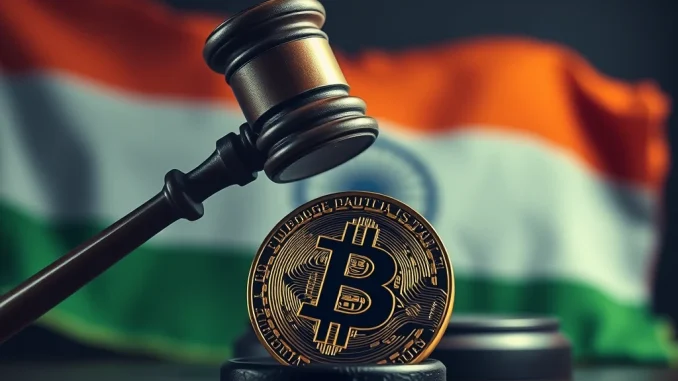
In a disheartening turn for cryptocurrency investors in India, the Supreme Court has delivered a significant blow to victims of the massive WazirX hack of July 2024. Imagine losing your hard-earned money in a cyberattack, only to be told by the highest court in the land that they can’t help you. This is the stark reality facing users of the Indian crypto exchange WazirX, who fell prey to a staggering $235 million theft, as reported by CCN. Justices BR Gavai and Augustine Masih have dismissed their petition, citing a critical gap in the nation’s legal framework: the absence of clear crypto regulations India.
Why Did the Supreme Court Reject the Petition? Understanding the Crypto Regulations India Gap
The core reason behind the Supreme Court’s decision is the current legal vacuum surrounding cryptocurrencies in India. The justices explicitly stated that without defined crypto regulations India, the issue falls under the purview of policy-making bodies, not judicial intervention. Essentially, they’re saying, “Our hands are tied.”
Let’s break down the implications:
- Regulatory Uncertainty: India’s stance on cryptocurrency has been a rollercoaster. While not outright banned, there’s no comprehensive legal framework governing crypto exchanges, transactions, or investor protection. This lack of clarity creates a grey area where legal recourse becomes incredibly challenging.
- Policy vs. Judiciary: The Supreme Court’s statement emphasizes the separation of powers. They interpret laws and ensure justice within existing frameworks. Creating new regulations or policies is the job of the legislature and government.
- Investor Vulnerability: In the absence of crypto regulations India, crypto investors are left in a precarious position. When exchanges get hacked or face other issues, there’s limited legal protection or avenues for compensation.
- Global Context: Many countries are grappling with crypto regulation, but some have made significant strides in creating frameworks to protect users and foster innovation. India’s current situation highlights the urgent need for a clear regulatory path.
The Devastating WazirX Hack: A Closer Look at the Cryptocurrency Exchange Breach
The WazirX hack in July 2024 was a watershed moment, exposing the vulnerabilities inherent in the crypto space, particularly in regions with nascent regulatory environments. $235 million vanished – a colossal sum impacting countless individuals who entrusted their funds to the cryptocurrency exchange.
Here’s what we know about the WazirX hack:
- Scale of the Theft: $235 million is not just a number; it represents the life savings, investments, and financial hopes of numerous users. This makes it one of the largest crypto heists in recent times in the Indian context.
- Impact on Users: Victims of the WazirX hack have faced immense financial and emotional distress. The loss is compounded by the feeling of helplessness and the now-dashed hopes of legal redressal.
- Security Concerns: The hack raises serious questions about the security measures implemented by cryptocurrency exchange platforms, especially in jurisdictions where regulatory oversight is weak.
- Reputational Damage: For WazirX, and for the Indian crypto industry as a whole, this incident casts a long shadow. It erodes trust and raises concerns about the safety of investing in crypto in India.
Supreme Court Decision: A Setback for Crypto Investors Seeking Victim Compensation
The Supreme Court decision to dismiss the petition is undoubtedly a setback for the victims seeking victim compensation. It underscores the harsh reality that in the absence of specific laws, the judiciary’s ability to intervene is limited. This ruling sends a chilling message about investor protection in the Indian crypto landscape.
What does this Supreme Court decision mean for victim compensation and future cases?
| Aspect | Implication of Supreme Court Decision |
|---|---|
| Immediate Relief for WazirX Hack Victims | Denied. The petition is dismissed, meaning no immediate judicial intervention to secure compensation. |
| Future Hack Victims | Sets a precedent. Without regulatory changes, future victims of crypto exchange hacks may face similar legal hurdles. |
| Pressure on Regulators | Potentially increases pressure on the Indian government to expedite the formulation of comprehensive crypto regulations India. |
| Investor Sentiment | Likely to dampen investor confidence in the Indian crypto market, especially concerning security and legal recourse. |
Navigating the Unregulated Crypto Landscape: Challenges and the Path Forward for Cryptocurrency Exchange Users
The current situation presents significant challenges for users of cryptocurrency exchange platforms in India. Without robust crypto regulations India, investors are essentially navigating uncharted waters. However, understanding these challenges is the first step towards finding a path forward.
Key Challenges:
- Lack of Legal Protection: As highlighted by the Supreme Court ruling, the absence of specific crypto laws means limited legal recourse in cases of fraud, hacks, or exchange failures.
- Operational Risks: Unregulated exchanges may be more prone to operational vulnerabilities, including inadequate security measures, lack of transparency, and potential mismanagement of funds.
- Market Volatility: The inherent volatility of the crypto market is amplified by the lack of regulatory oversight, potentially leading to greater price swings and risks for investors.
- Limited Consumer Education: Without regulatory frameworks pushing for investor awareness, many individuals may enter the crypto market without fully understanding the risks involved.
Path Forward (Actionable Insights):
- Advocate for Regulation: The crypto community and investors need to actively advocate for clear and comprehensive crypto regulations India. This includes engaging with policymakers and participating in public consultations.
- Due Diligence in Exchange Selection: Users must exercise extreme caution when choosing a cryptocurrency exchange. Research their security practices, track record, and user reviews. Consider using exchanges with robust security features and a transparent operational model.
- Diversification and Risk Management: Never put all your eggs in one basket. Diversify your crypto holdings and understand the risks associated with different cryptocurrencies and platforms. Invest only what you can afford to lose.
- Stay Informed: Keep abreast of developments in crypto regulations India and globally. Educate yourself about crypto security best practices and stay vigilant against scams and fraudulent schemes.
The Future of Crypto in India: Will Regulations Emerge to Protect Investors?
The dismissal of the WazirX hack victims’ petition serves as a wake-up call. It starkly illustrates the urgent need for a robust regulatory framework for cryptocurrencies in India. The question now is: what does the future hold for crypto regulations India and investor protection?
Potential Future Scenarios:
- Accelerated Regulatory Push: The Supreme Court’s decision might spur the Indian government to prioritize and expedite the formulation of comprehensive crypto regulations India. This could involve defining legal classifications for cryptocurrencies, setting up licensing frameworks for exchanges, and establishing investor protection mechanisms.
- Gradual Regulatory Evolution: Regulations might emerge in a phased manner, starting with basic frameworks and gradually evolving to address more complex aspects of the crypto ecosystem. This could be a slower process but might allow for more nuanced and adaptable regulations.
- Continued Regulatory Uncertainty: There’s also a possibility that regulatory uncertainty could persist for some time. This would continue to leave investors vulnerable and could hinder the growth and mainstream adoption of cryptocurrencies in India.
The path forward hinges on the Indian government’s response. Will they heed the Supreme Court’s implicit call for regulatory action? The fate of crypto investors and the future of the Indian crypto industry depend on it.
Conclusion: A Stark Reminder of the Urgent Need for Crypto Regulations India
The Supreme Court’s rejection of the WazirX hack victims’ petition is a sobering moment for the Indian crypto community. It’s a harsh lesson in the realities of operating in an unregulated space. While the court’s decision is based on the current legal framework (or lack thereof), it amplifies the urgent need for comprehensive crypto regulations India. For investors, it’s a reminder of the risks involved and the importance of caution, due diligence, and collective advocacy for a safer and more regulated crypto future in India. The dream of a thriving and secure crypto ecosystem in India hinges on the swift and effective implementation of robust crypto regulations India that protect investors and foster responsible innovation.



